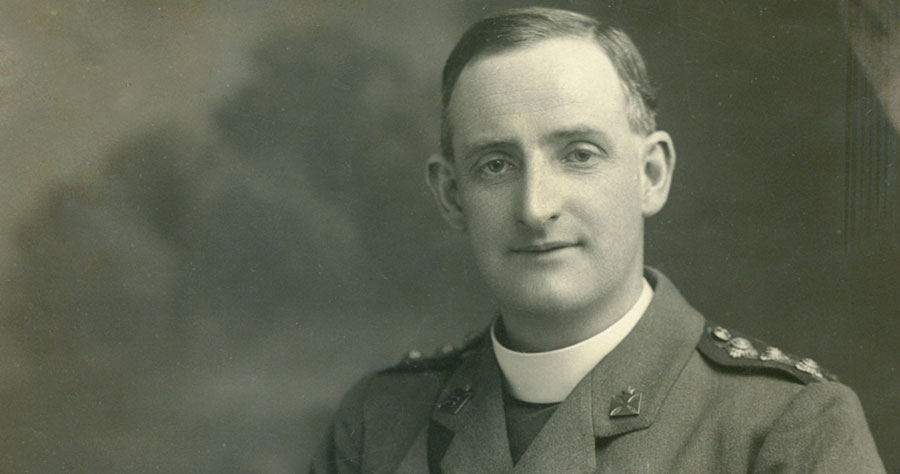“I could not say too much about your son. He was loved and reverenced by us all; his gallantry, self-sacrifice, and devotion to duty were so well-known and recognised. I think that his was the most wonderful character that I have ever known.”
These words were written to Hugh Doyle, the father of Willie Doyle SJ, by Major General Hickie, Commander of the 16th (Irish) Division, after the death of Fr Doyle at Passchendale in August 1917. Reading Patrick Kenny’s book, it becomes easy to see how such praise was merited, and difficult to understand why Fr Willie Doyle is not better known and esteemed in his native country.
Willie Doyle SJ is surely one of our nation’s unsung heroes; unsung, that is, in his own country, but this man was tremendously influential elsewhere. He was an important influence in the lives of several canonized saints, including St Josemaria Escriva and St Teresa of Calcutta. More importantly, perhaps, he influenced a vast number of his contemporaries through his writings, his ministry and his radical openness to grace.
Interestingly, no less a figure than Joseph Ratzinger quotes Fr Doyle in his magisterial Principles of Catholic Theology. Ratzinger’s quotation does not feature in Kenny’s book, but it is worth noting: “I do not believe I could ever find food for vainglory or pride in anything I do – any more than an organ grinder can take pride in the beautiful music he produces when he turns the handle…. I feel ashamed when people praise me … just as a piano might feel ashamed if someone were to compliment it on the beautiful music that flows from its keys.”
Why the subsequent neglect of Fr Doyle’s memory? Patrick Kenny’s oblique suggestion is that our earlier ambivalence regarding the involvement of Irishmen in the First World War may be at the root of the silence. Now that we’re shedding some of that ambivalence, it may well be that Willie Doyle’s time has come.
This is not a work of hagiography. Kenny’s introductory biography is reserved and dispassionate, yet he presents his subject as “a spiritual tactician of the highest order.” After the 24-page introduction, it is Fr Doyle himself who speaks for the remainder of the book. Before reading this short work, I was unacquainted with Willie Doyle. But Kenny’s skill as a writer and compiler, coupled with the humanity and stature of his subject, left me feeling that I had encountered a very great man – indeed, a true saint.
Fr Doyle felt called to a life of hardship and sacrifice; he hoped to die a “martyr of charity,” and this is what transpired: he was killed by an exploding shell while making his way to help wounded soldiers. Fr Doyle’s courage was not the absence of fear: “My real feeling,” he wrote, “was abject fear and I often shook like a leaf.” What enabled him to endure the hardship and terror of trench warfare was his spirit of service, his deep, disciplined faith and a warm, personal relationship with his Lord.
The great gift of Kenny’s book is that Fr Doyle’s personality shines through these pages. He has a wry, self-deprecating humour which helps him to rise above his circumstances. Of his experience in the sodden trenches he writes: “my feet were in the water which helped to keep the fires of devotion from growing too warm.”
This heroic Jesuit has a wonderful turn of phrase. After midnight Mass, 1916, he observes: “peace and good will – hatred and bloodshed.” He senses that the Lord is saying to him: “You must be your own executioner.” His spiritual aphorisms are worthy of the Book of Proverbs: “A sharp tongue is the only edged tool that grows sharper with use”; “welcome the hard black days as real harvest time”; “the cross is really light when you take it bit by bit.”
Fr Doyle’s language may occasionally be a bit saccharine for contemporary sensibilities; this is most evident in his meditations on the Stations of the Cross. But given the intelligence, strength and stature of the man, perhaps it is contemporary sensibilities that should be called into question by him, rather than vice versa. This is, after all, what saints do: they interrogate us. It is well worth being interrogated by Fr Willie Doyle SJ, and Patrick Kenny has done a great service to the Irish Church by presenting this heroic figure in such a lively and accessible way.
About the Author: Rev. Chris Hayden
Rev. Chris Hayden is a priest of the Ferns diocese and is the editor of Intercom.
This review first appeared in the October issue of Intercom and is reprinted with the kind permission of the editor.

